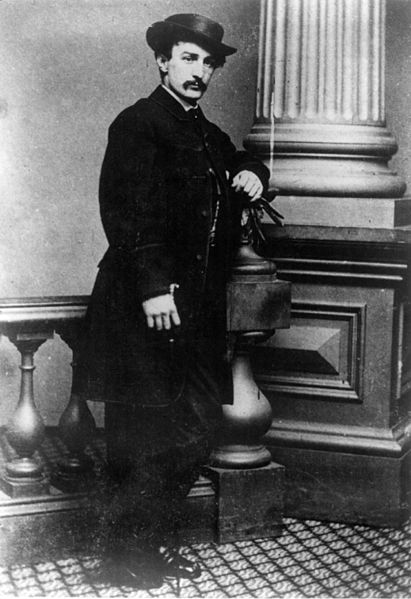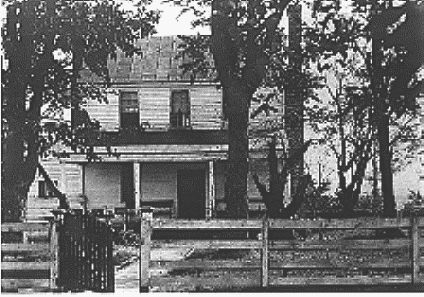On April 24, 1865, Lieutenant Edward Doherty sits on a bench across from the White House conversing with another officer. The arrival of a messenger interrupts the conversation. The messenger carries orders directing Doherty to lead a squad of cavalry to Virginia to search for Booth and Herold. Scouring the countryside around the Rappahoneck River, Doherty is told the two fugitives were last seen at a farm owned by Richard Garrett. Doherty leads his squad to the farm arriving in the early morning hours of April 26.
I dismounted, and knocked loudly at the front door. Old Mr. Garrett came out. I seized him, and asked him where the men were who had gone to the woods when the cavalry passed the previous afternoon. While I was speaking with him some of the men had entered the house to search it. Soon one of the soldiers sang out, ‘O Lieutenant! I have a man here I found in the corn-crib.’ It was young Garrett, and I demanded the whereabouts of the fugitives. He replied, ‘In the barn.’ Leaving a few men around the house, we proceeded in the direction of the barn, which we surrounded. I kicked on the door of the barn several times without receiving a reply. Meantime another son of the Garrett’s had been captured. The barn was secured with a padlock, and young Garrett carried the key. I unlocked the door, and again summoned the inmates of the building to surrender.
After some delay Booth said, ‘For whom do you take me?’
I replied, ‘It doesn’t make any difference. Come out.’
He said, ‘I am a cripple and alone.’
I said, ‘I know who is with you, and you had better surrender.’
He replied, ‘I may be taken by my friends, but not by my foes.’
I said, ‘If you don’t come out, I’ll burn the building.’ I directed a corporal to pile up some hay in a crack in the wall of the barn and set the building on fire.
As the corporal was picking up the hay and brush Booth said, ‘If you come back here I will put a bullet through you.’
I then motioned to the corporal to desist, and decided to wait for daylight and then to enter the barn by both doors and over power the assassins.
Booth then said in a drawling voice. ‘Oh Captain! There is a man here who wants to surrender awful bad.’
I replied, ‘You had better follow his example and come out.’
His answer was, ‘No, I have not made up my mind; but draw your men up fifty paces off and give me a chance for my life.’
“I told him I had not come to fight; that I had fifty men, and could take him.

Photo of the Garrett Farm near Port Royal, Virginia, where John Wilkes Booth, the assassin of U.S. President Abraham Lincoln, died.
Then he said, ‘Well, my brave boys, prepare me a stretcher, and place another stain on our glorious banner.’
At this moment Herold reached the door. I asked him to hand out his arms; he replied that he had none. I told him I knew exactly what weapons he had. Booth replied, ‘I own all the arms, and may have to use them on you, gentlemen.’ I then said to Herold, ‘Let me see your hands.’ He put them through the partly opened door and I seized him by the wrists. I handed him over to a non-commissioned officer. Just at this moment I heard a shot, and thought Booth had shot himself. Throwing open the door, I saw that the straw and hay behind Booth were on fire. He was half-turning towards it.
He had a crutch, and he held a carbine in his hand. I rushed into the burning barn, followed by my men, and as he was falling caught him under the arms and pulled him out of the barn. The burning building becoming too hot, I had him carried to the veranda of Garrett’s house.
Booth received his death-shot in this manner. While I was taking Herold out of the barn one of the detectives went to the rear, and pulling out some protruding straw set fire to it. I had placed Sergeant Boston Corbett at a large crack in the side of the barn, and he, seeing by the igniting hay that Booth was leveling his carbine at either Herold or myself, fired, to disable him in the arm; but Booth making a sudden move, the aim erred, and the bullet struck Booth in the back of the head, about an inch below the spot where his shot had entered the head of Mr. Lincoln. Booth asked me by signs to raise his hands. I lifted them up and he gasped, ‘Useless, useless!’ We gave him brandy and water, but he could not swallow it. I sent to Port Royal for a physician, who could do nothing when he came, and at seven o’clock Booth breathed his last. He had on his person a diary, a large bowie knife, two pistols, a compass and a draft on Canada for 60 pounds.
Visit Eyewitness History to read more about the death of John Wilkes Booth.
Comment |

 Share on Facebook
Share on Facebook
 Tweet
Tweet
 Add My Story
Add My Story






